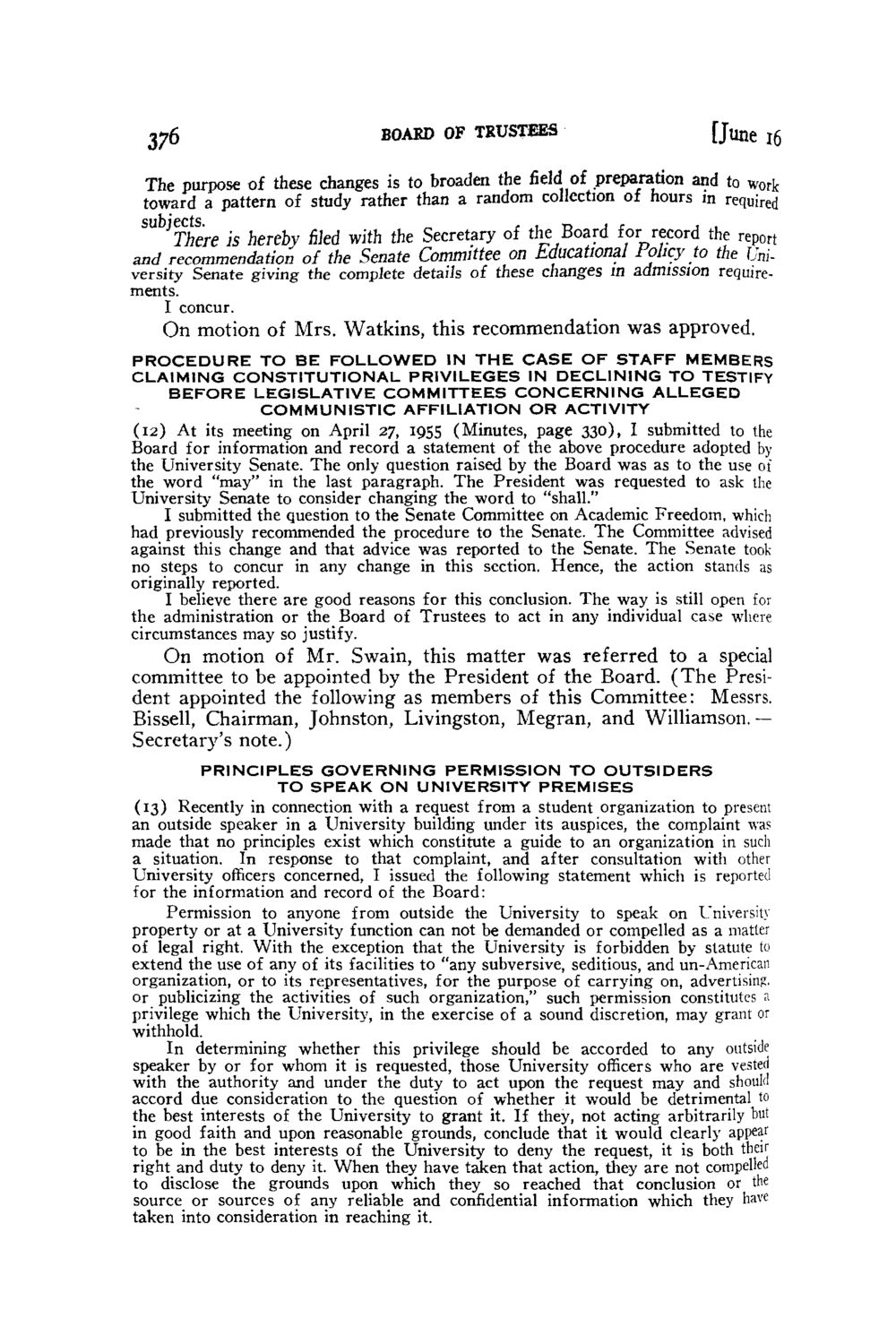| |
| |
Caption: Board of Trustees Minutes - 1956
This is a reduced-resolution page image for fast online browsing.

EXTRACTED TEXT FROM PAGE:
376 BOAKD OF TRUSTEES [June !6 The purpose of these changes is to broaden the field of preparation and to work toward a pattern of study rather than a random collection of hours m required SU 'There is hereby fled with the Secretary of the Board for record the report and recommendation of the Senate Committee on Educational Policy to the University Senate giving the complete details of these changes in admission requirements. I concur. O n m o t i o n of M r s . W a t k i n s , t h i s r e c o m m e n d a t i o n w a s a p p r o v e d . PROCEDURE TO BE FOLLOWED IN T H E CASE OF STAFF MEMBERS CLAIMING CONSTITUTIONAL PRIVILEGES IN DECLINING TO TESTIFY BEFORE LEGISLATIVE COMMITTEES CONCERNING ALLEGED COMMUNISTIC AFFILIATION OR ACTIVITY (12) At its meeting on April 27, 1955 (Minutes, page 330), I submitted to the Board for information and record a statement of the above procedure adopted by the University Senate. The only question raised by the Board was as to the use of the word "may" in the last paragraph. The President was requested to ask the University Senate to consider changing the word to "shall." I submitted the question to the Senate Committee on Academic Freedom, which had previously recommended the procedure to the Senate. The Committee advised against this change and that advice was reported to the Senate. The Senate took no steps to concur in any change in this section. Hence, the action stands as originally reported. I believe there are good reasons for this conclusion. The way is still open for the administration or the Board of Trustees to act in any individual case where circumstances may so justify. O n m o t i o n of M r . S w a i n , t h i s m a t t e r w a s r e f e r r e d t o a special c o m m i t t e e t o b e a p p o i n t e d b y t h e P r e s i d e n t of t h e B o a r d . ( T h e Presid e n t a p p o i n t e d t h e f o l l o w i n g a s m e m b e r s of t h i s C o m m i t t e e : Messrs. Bissell, C h a i r m a n , J o h n s t o n , L i v i n g s t o n , M e g r a n , a n d Williamson. — Secretary's note.) PRINCIPLES GOVERNING PERMISSION TO OUTSIDERS TO SPEAK ON UNIVERSITY PREMISES (13) Recently in connection with a request from a student organization to present an outside speaker in a University building under its auspices, the complaint was made that no principles exist which constitute a guide to an organization in such a situation. In response to that complaint, and after consultation with other University officers concerned, I issued the following statement which is reported for the information and record of the Board: Permission to anyone from outside the University to speak on University property or at a University function can not be demanded or compelled as a matter of legal right. With the exception that the University is forbidden by statute to extend the use of any of its facilities to "any subversive, seditious, and un-American organization, or to its representatives, for the purpose of carrying on, advertising, or publicizing the activities of such organization," such permission constitutes a privilege which the University, in the exercise of a sound discretion, may grant or withhold. In determining whether this privilege should be accorded to any outside speaker by or for whom it is requested, those University officers who are vested with the authority and under the duty to act upon the request may and should accord due consideration to the question of whether it would be detrimental to the best interests of the University to grant it. If they, not acting arbitrarily hut in good faith and upon reasonable grounds, conclude that it would clearly appear to be in the best interests of the University to deny the request, it is both their right and duty to deny it. When they have taken that action, they are not compelled to disclose the grounds upon which they so reached that conclusion or the source or sources of any reliable and confidential information which they have taken into consideration in reaching it.
| |